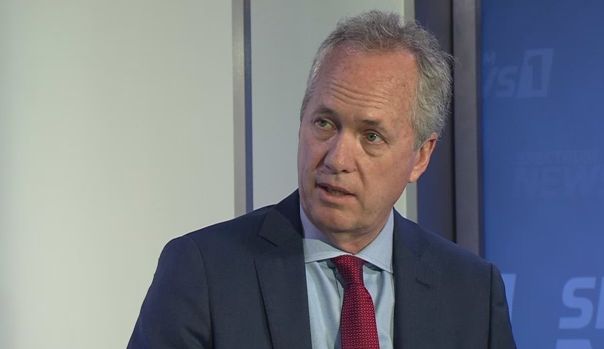LOUISVILLE, Ky. – Louisville is facing a staggering budget deficit because of the coronavirus. Mayor Greg Fischer (D) delivered a very bleak budget address before the Louisville Metro Council Thursday. He said increased taxes or a reduction in every single city department is the only way to recover.
COVID-19 has forced a major economic downturn not just in Louisville, but in every city in America. Fischer said Louisville Metro Government (LMG) is projecting a $46 million revenue drop for the current fiscal year, which ends June 30, and another $69 million shortfall for the 2021 fiscal year.
Fischer explained to the council the deficits are so large for FY21 and FY22 for several reasons. Critical services — police, fire, EMS, 911, public health, sanitation, roads, parks, libraries, and community centers — are funded by taxes businesses and employees pay.
Approximately 47% of the city budget comes from payroll taxes. Since businesses have been forced to cut jobs and the number of people earning money has dropped, city revenue has also declined.
Businesses also pay taxes on profits and roughly 11% of the city's budget is funded this way. The economy is down and businesses are making fewer profits.
Service fees from EMS, the Louisville Water Company, and the Louisville Zoo and others also provide about 10% of the city's revenue.
The mayor also noted pushing back the tax filing deadlines now means the city has less cash on hand. Tax deadlines were extended to July 15.
It is because of these factors and a few others that Fischer said LMG is projecting $46 million in lost General Fund revenue. The current fiscal year ends in 68 days.
“For context, remember the painful cuts forced by a $25 million deficit last year?” the Mayor said, “Now, we’re facing the prospect of cuts about three times that amount. There is simply no way to absorb this level of loss without considering a significant tax increase or reducing every single agency of Metro Government, including our top priority of public safety since it makes up over 60 percent of our budget.”
380 Metro employees have already been furloughed because of the budget situation and without assistance the city could be looking at possible layoffs and more furloughs.
The CARES Act provided LMG with $134 million for COVID-19 expenses, but the law doesn't allow cities to use any of that money for budget shortfalls.
“Think about it – we are in the middle of a pandemic, unlike anything we have seen in our lifetimes. Is now the time for cities to cut public health workers? Is now the time for cities to cut police officers, paramedics, or emergency management personnel? … Of course not,” he continued. “But that is what we face, right here in Louisville and in every city around the nation, if Congress and the White House do not step up.”
Fischer continued saying the need to dramatically increase COVID-19 testing and tracing are also impacting budget planning.
The Mayor told council members the only way to move onto the next phase of restarting the city, is to have high-volume and quick-turnaround testing and that takes an expanded health department. Fischer said costs for this type of project depend on the number of people infected but it could be anywhere from $25 to $100 million.
“Just this week, Congress issued $25 billion for testing,” he said. “We are still waiting on information from the federal Department of Health and Human Services to let us know what our local allocation will be.”
And, it appears LMG city will be able to tap into the federal funding provided to the city for COVID-19 expenses for this need, the Mayor said, although there remains uncertainty about which parts can and will be covered by the federal or state governments.”
The mayor said the federal funds aren't enough to get Louisville out of the financial hole.
The mayor is legally required to present a budget, but said the uncertainty of what Louisville is going through now, makes it “impossible – really, irresponsible – to make meaningful budget and revenue projections for the coming year.” Fischer proposed a continuation of the current FY21 budget which would continue the current fiscal year's funding levels. He hopes questions about how much federal support the city will receive is cleared up in the next month.
Fischer said, “But we make this recommendation knowing we will be revisiting this budget in the weeks and months ahead, maybe more than once, making revisions as our fiscal picture becomes clearer.
This was the Mayor's 10 budget speech but the first-time his remarks were taped and shared with Metro Council online, who like everyone is practicing social distancing.
Fischer said LMG continues to work to address the immediate health crisis but is also working to reopen the city. Like President Donald Trump (R), and Governor Andy Beshear (D-Kentucky), Fisher has a three-phase recovery plan.
Phase I - Before the virus arrival, LMG set up the Incident Management Team which has collected data, identified challenges, developed contingency plans, and executed strategies.
Phase II - Here the city will take the first steps toward reopening, once health experts and data make clear it’s safe to gradually ease some of the social distancing restrictions. He said this could begin in a few weeks.
Phase III - This would restart the city’s economy.
But the Mayor doesn't want to more than, "restore a flawed system that benefitted too few at the expense of too many.”
Mayor Fischer announced the “Build Back Better, Together” initiative, a roadmap for Louisville’s economic recovery, created in consultation with experts and community partners. The initiative, like that of Beshear's, seeks input from the public and businesses on how to create a better system. You can share your thoughts at the website.
